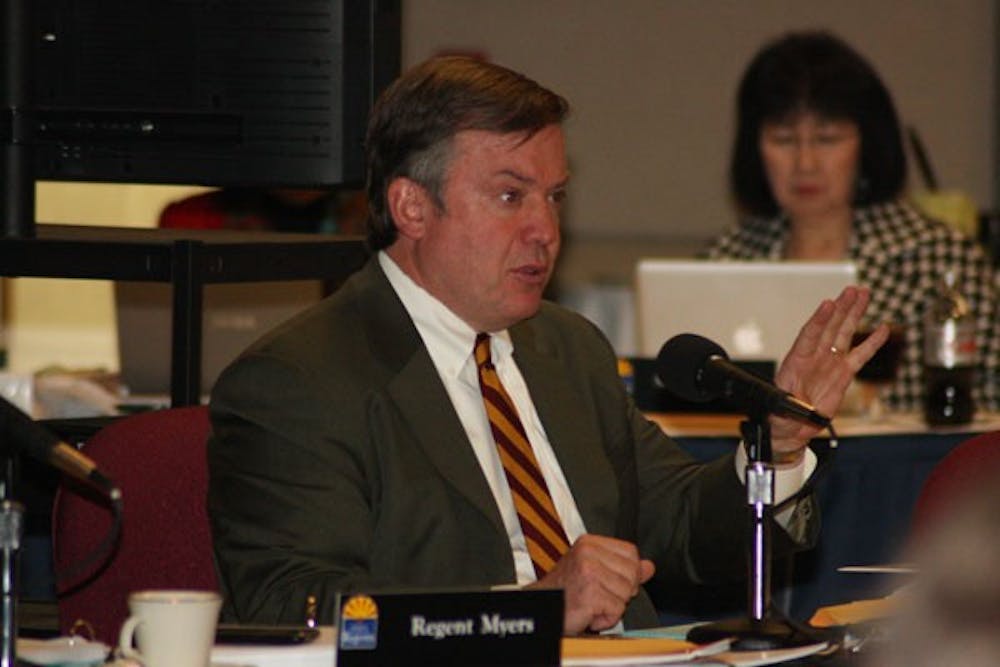The Arizona Board of Regents approved tuition increases Thursday that go beyond the University’s tuition predictability commitment, raising tuition nearly 20 percent overall for incoming students and about 13 percent for continuing in-state students.
Tuition for residents entering ASU in the fall will be $7,793, while continuing students will pay between $6,607 and $7,322.
Tuition for this year’s incoming freshmen was $6,507, including a $510 surcharge. Not counting the 2009-10 surcharge, next year’s incoming undergraduates will pay nearly 30 percent more than current freshmen.
In the meeting, regents decided the University can no longer differentiate between tuition and an economic recovery surcharge, rolling the surcharge into a tuition increase.
The University’s original proposal was a 5 percent increase in tuition for all in-state students, plus a $1,025 economic recovery surcharge for all students.
ASU’s predictable tuition increase model, approved by the Board of Regents in 2007, states that students can plan on tuition increasing 5 percent each year for four years. The original proposal conformed to the model because the surcharge was not considered part of tuition.
“That predictability model is officially obliterated,” said Undergraduate Student Government President Brendan O’Kelly.
USG will work on a bill to add a footnote to tuition statements explaining why $1,025 has been added to the price of University attendance, O’Kelly said.
The surcharge, which is $510 this academic year, was created to make up for a drop in ASU’s state funding.
By combining the surcharge with tuition, the 5 percent increase for next year will be higher than originally planned if tuition remains at the level proposed in Thursday’s meeting, O’Kelly said.
Continuing the predictability model assumes no sharp drops in state funding, and the University reserves the right to change tuition beyond the model, according to the ASU Web site. State funding to ASU has dropped by $104 million in the last two years.
ABOR President Ernest Calderón said in an e-mail that it’s not a given that tuition will be raised again for the 2011-12 school year.
“It is the Board’s position that tuition may be reviewed from $0 each year,” he said.
Thursday’s discussion of including the surcharge within tuition began during consideration of UA’s tuition proposal. One regent, Bob McLendon, voted against the merger.
“By calling it a surcharge, it indicates that we are in unusual circumstances,” McLendon said. “If we no longer call it a surcharge … when we start considering tuition next year, that number will be there.”
McLendon added that the word “surcharge” provides more transparency of why tuition has increased.
But Calderón disagreed.
“I think if we get rid of ‘surcharge’ and roll it into tuition, it is more honest,” Calderón said.
USG is currently campaigning to get students more involved in the legislative process and educate them on how state cuts affect tuition.
“[Not separating ‘surcharge’ from tuition] makes it harder for us to inform students of what state cuts cost them,” O’Kelly said.
Regent Dennis DeConcini said he voted on the surcharge last year with an understanding that it was a financial emergency.
“It was a one-time surcharge that was not anticipated to be continued,” DeConcini said.
The $1,025 surcharge was originally meant to be $750, but the amount changed when the universities learned of a $30 million reduction in stimulus funds, according to an ASU press release.
In addition to the surcharge language, some regents expressed concerns over the upcoming statewide sales tax vote and what it could mean financially for the universities.
“If that 1 cent sales tax doesn’t pass, I think we’re looking down the road at disaster,” McLendon said.
The proposed tax, which will appear on the May 18 ballot as Prop 100, would increase the state sales tax from 5.6 cents per dollar to 6.6 cents per dollar.
ASU President Michael Crow said if Prop 100 is voted down, it will cause “an extremely stressful set of financial circumstances” for the universities.
The three universities have already lost about 21 percent, or $231 million, of their state funding, Crow said, and 50 percent of the universities’ funds fluctuate because of the state’s unpredictable financial changes.
If the tax measure fails, loss of state funds could swell to 31 percent, he said.
UA President Robert Shelton said if the tax does not pass, his university would lose between $34 million and $40 million in funding.
When you have numbers that large, Shelton said, universities then have only two options to save money: cut salaries or cut financial aid.
“We could cut hundreds of positions,” Shelton said.
Along with ASU’s tuition increase proposal, a $75-per-semester facilities fee was also approved at the meeting.
Reach the reporter at kjdaly@asu.edu





